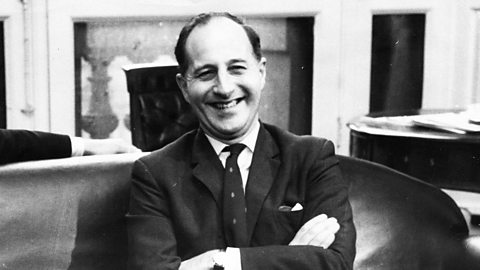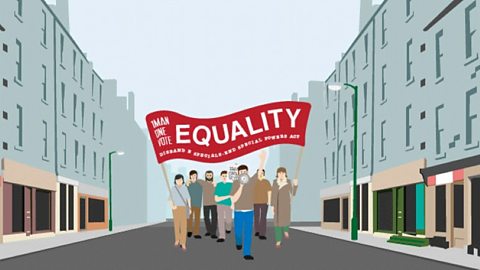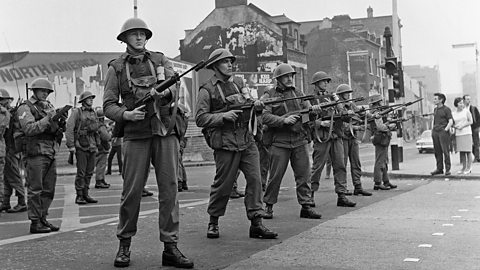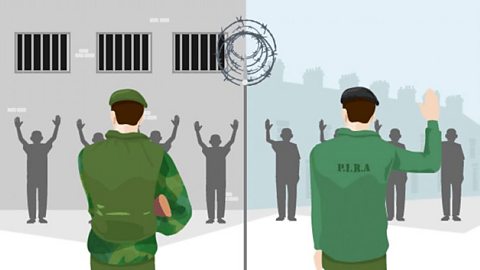A new Prime Minister

Terence OÔÇÖNeill became Northern IrelandÔÇÖs Prime Minister in March 1963.
He was seen as more forward thinking than his predecessor, Lord Brookeborough, who had been in power for 20 years.
However, right from the start, OÔÇÖNeillÔÇÖs leadership was weakened as most of his partyÔÇÖs MPs had wanted another minister, Brian Faulkner, to get the job.
Economic problems
Overview of Northern Ireland in the 1960s
OÔÇÖNeill knew that Northern Ireland was in a bad way economically and so his immediate aim was to improve its economicinfrastructureThe basic structures needed for an area to function, for example roads and communications..
To that end, he introduced a number of key policies.
These included:
- Creating a Ministry of Development to drive the economy forward.
- Launching an Economic Council to spearhead economic modernisation.
- Setting up five economic zones to ensure the modernisation of existing industries and to help bring new industries to the province.
- Investing £900 million in the local economy.
- Kickstarting the modernisation of the transport system (road and rail).
- Beginning co-operation with the Irish trade unionAn organisation whose main purpose is to represent the interests of workers in a specific type of business or industry. Congress
- Creating the new city of Craigavon.
- Building a new university campus in Coleraine.
Successful policies
There is certainly evidence that OÔÇÖNeillÔÇÖs economic policies were beginning to work.
For example:
- Several international companies - including Michelin, DuPont, Goodyear, ICI and Grundig - built factories in Northern Ireland.
- Work started on the construction of the M1 motorway which would link Belfast and Dungannon.
- An agreement was signed with the Dublin government over the supply of electricity.
- Belfast benefitted from the opening of a new oil refinery.
- Development started on a new airport.
- Close to 35,000 new jobs were created.
Unsuccessful policies
Unemployment in Northern Ireland was a problem throughout the 1960s
Despite these successes, the economy was still weakened by a number of basic problems:
- Unemployment levels were never lower than 7 per cent.
- A lack of work in industries such as linen and shipbuilding meant that over 20,000 jobs were lost.
- The government had to give money to shipbuilders Harland and Wolff to keep the company open.
- Attracting investment to areas west of the River Bann proved to be more difficult as companies viewed the region as being too far from their exportTo sell goods to other countries and send them out of the country to them. The goods are known as exports. markets to open factories.
- This last fact alone had significant implications, not only for unemployment in the west (over 12.5 per cent) but also for feeding allegations of biasPreference for or against one person or group. in government policy.
This was because the majority of the population in the west was nationalistPeople who believe their country should be independent from other nations. For example, Irish nationalists, who want Ireland to be fully independent of Britain..
Relations with the Republic of Ireland
OÔÇÖNeill knew that improving the economy was not enough to change Northern Ireland.
He realised that there would have to be improvements in a number of other areas, not least:
- Relations with the Republic of Ireland.
- Relations within Northern Ireland.
The "Hand of Friendship": Dublin
As a result of their troubled past, the Prime Ministers of the two parts of Ireland had not met since 1925 (when James Craig met W.T. Cosgrave in London over the leaked Boundary Commission report.)
This changed in January 1965 when OÔÇÖNeill met with the TaoiseachThe prime minister of the Republic of Ireland (formerly ├ëire). The word is Irish for chieftain.Se├ín Lemass at Stormont.
The two men discussed issues of common concern, such as the economy whilst their ministerial colleagues discussed issues such as tourism and electrical link-ups.
In December 1967, OÔÇÖNeill travelled to Dublin to meet LemassÔÇÖ successor, Jack Lynch.
Within Northern Ireland
Northern Ireland was a divided society
OÔÇÖNeill knew that relations between the two communities living in Northern Ireland also had to improve.
To encourage better relations, O'Neill:
- Met Cardinal William Conway. Cardinal Conway was the Archbishop of Armagh and, therefore, spiritual leader of the countryÔÇÖs Catholics.
- Offered the governmentÔÇÖs official condolences when Pope John XXIII died in June 1963.
- Began to visit Catholic schools and hospitals.
- Increased the funding that his government gave to Catholic schools and hospitals.
OÔÇÖNeillÔÇÖs policies: support and opposition
Not surprisingly, OÔÇÖNeillÔÇÖs policies led to a range of reactions among Northern IrelandÔÇÖs divided population.
Unionist reaction
Within the unionistA person who believes the union between Britain and Northern Ireland should continue. community there was both support and opposition:
- There was opposition to LemassÔÇÖ visit to Stormont in January 1965 from within OÔÇÖNeillÔÇÖs own cabinetThe name given to the core group of politicians who carry out the major roles within the ruling government of a country.. Minister of Commerce, Brian Faulkner, complained that he knew nothing about what OÔÇÖNeill was planning.
- Although there was no significant public opposition to LemassÔÇÖ Stormont visit, there was strong objection from Rev Ian Paisley, the leader of the Free Presbyterian ChurchA religious grouping set up by Rev Ian Paisley in 1951..
In addition to his concerns about the influence of the Catholic Church in the Republic, Paisley objected to any links with the South, especially as Articles II and IIIArticle II of the 1937 Irish constitution claimed the right of the Irish government to rule over the whole island. Article III of the constitution added that, until partition ended, ├ëireÔÇÖs laws would only apply to the 26 counties currently governed by Dublin. of its constitutionRules by which a country is organised and governed. laid claim to the whole island of Ireland.
However, when TaoiseachThe prime minister of the Republic of Ireland (formerly Éire). The word is Irish for chieftain. Jack Lynch visited Northern Ireland in December 1967, the visit was agreed in advance by O'Neill's cabinet, implying that by then such a visit had become more acceptable.
Nationalist reaction
Catholic leaders, both political and religious, were initially supportive of OÔÇÖNeillÔÇÖs policies.
Shortly after Lemass visited Stormont, the nationalistPeople who believe their country should be independent from other nations. For example, Irish nationalists, who want Ireland to be fully independent of Britain. party decided, for the first time ever, to take up the role of official opposition The second largest party in a parliament. in Stormont.
At the same time there were problems with what OÔÇÖNeill was trying to do.
- His policies made nationalists believe that there were going to be more and more reforms. Since OÔÇÖNeill did not have total support for his policies within his own party, this was going to be very hard to achieve.
- Some of the things that OÔÇÖNeill did led to a negative reaction, particularly amongst a new generation of Catholic leaders. For example:
- The decision to name the new town linking Lurgan and Portadown after Northern IrelandÔÇÖs founder, Lord Craigavon, did not go down well.
- Northern IrelandÔÇÖs new university was sited in Coleraine (a Protestant town) rather than Derry/Londonderry (a Catholic city and the second largest population area within Northern Ireland).
- OÔÇÖNeill was less than successful in attracting foreign investmentMoney or capital put into a business for profitable returns, for example interest or income. west of the River Bann, which was a more nationalist area.
In addition, no significant attempts were made to increase Catholic membership of various health and education bodies.
Violence and division
Tensions increased in 1966 with the commemorations for the 50th anniversary of the Easter Rising, 1916An armed rebellion, centred in Dublin during Easter 1916, by Irish republicans who wanted to end British rule in Ireland. and the The Battle of the SommeWorld War One battle which lasted from 1 July to 18 November 1916..
Rioting broke out.
Then two Catholics died in May and June 1966, the result of a series of gun attacks by the re-emergingUlster Volunteer Force (UVF)A loyalist paramilitary organisation which could trace its origins back to 1912 and the fight against Home Rule in Ireland ÔÇô it later re-emerged in 1966 and was active throughout the Northern Ireland 'Troubles'..
OÔÇÖNeill responded by banning the organisation.
As the situation worsened, OÔÇÖNeill found that his support within his own party was weakening.
- In September 1966, he revealed a plot by Ulster Unionist Party backbencherA member of a party who sits in the rows of seats at the back of a parliament and who does not have an important position in the government or the Opposition. to remove him as leader.
- There were also growing rumours of opposition from Deputy Prime Minister, Brian Faulkner and Agriculture Minister, Harry West.
- By late 1967, OÔÇÖNeillÔÇÖs support within unionistA person who believes the union between Britain and Northern Ireland should continue. in general and the Ulster Unionist Party in particular was dwindling.
- His party was divided over strategy, while opinion polls indicated increasing support within the unionist population for Rev Ian PaisleyÔÇÖs policies.
WATCH: The O'Neill years
Test your knowledge
More on Changing relations: Northern Ireland and its neighbours, 1965-98
Find out more by working through a topic
- count2 of 11

- count3 of 11

- count5 of 11
